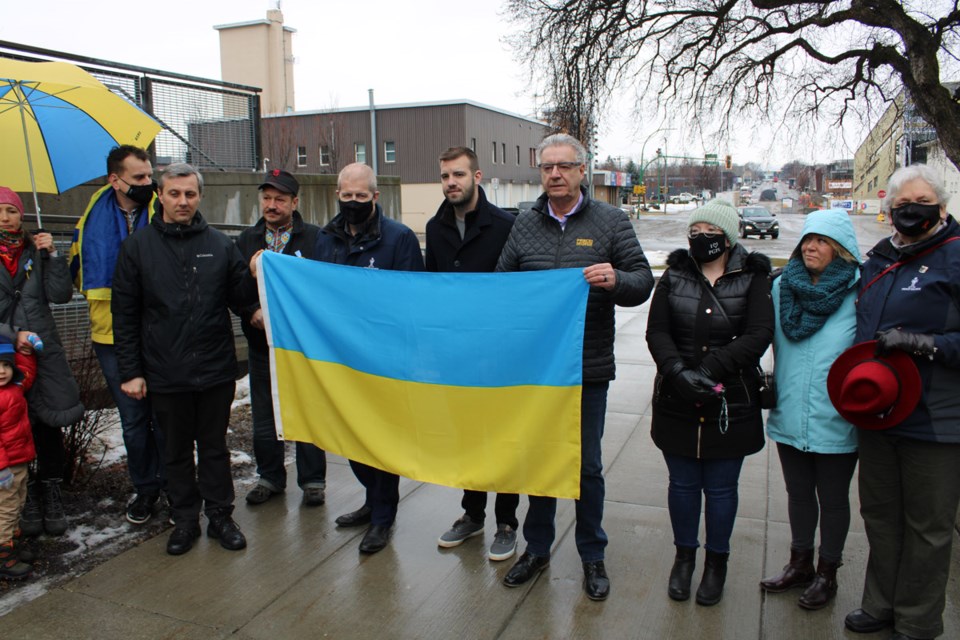As of the middle of October, Prince George for Ukraine had helped 117 Ukrainian refugees resettle in Prince George, and supported another seven resettling in other northern B.C. communities.
The volunteer group formed in March to serve as a central group to coordinate local efforts to provide humanitarian aid to people in Ukraine and those fleeing the Russian invasion of the country. The United Nations High Commissioner for Refugees (UNHCR) estimates that more than 7.75 million Ukrainians have fled since Russia invaded in February.
“When the war started, there was a lot of groups asking ‘What can we do to help?’” Prince George for Ukraine volunteer Charles Scott said. “When something like this happens, you have 153 people trying to help all at once.”
St. George’s Ukrainian Catholic Church, Share Hope Refugee Sponsorship Committee, Mennonite Central Committee, Immigrant and Multicultural Services Society (IMSS), Prince George Community Foundation, Yalenka Ukrainian Dancers, all levels of local government, Prince George Chamber of Commerce and others came together to help, Scott said.
“We’re all volunteers,” Scott said. “It’s very telling that groups helping Ukrainians in the Fraser Valley and in Calgary are sending people to Prince George, when they don’t have the capacity. Vancouver and Calgary are both referring (refugees) to us.”
A helping hand
The group provides information to Ukrainians, either still in Ukraine or who have fled to neighbouring countries, with information about coming to Prince George and help connect them with host families, information, English language training, jobs and other resources when they arrive.
“We place Ukrainians with host families, when we can,” Scott said. “Just to give them a landing space to get their feet under them.”
During the first few months, there are often a lot of questions, ranging from where to buy groceries to how to apply for a Canadian drivers licence and get certified to work in Canada, Scott said. Prince George for Ukraine works with refugees and host families to provide those answers, he added.
Typically after about three months, the families are looking to get their own place, and Prince George for Ukraine and especially the Mennonite Central Committee can help there too.
“The Mennonite Central Committee has a large number of (housing) units in Prince George,” Scott said. “When they are ready, we help move them into their own place.”
The Mennonite Central Committee owns more than 1,000 housing units in the city and has provided them to Ukrainian refugee families at very reasonable rents, he said.
IMSS is providing English as a Second Language training, and the majority of the approximately 70 adult refugees have found employment with local companies, Scott said. Many companies have agreed to take on people whose language skills aren’t “business ready” yet, he added, but whose skills will add value to the company in the short and longer term.
“There are six or seven whose English is zero,” Scott said. “They are not employable yet, but they will be.”
How to help
Donating to the Red Cross Ukrainian relief efforts is one of the best ways to help people still in Ukraine, Scott said.
The UNHRC also accepts donations to support its refugee relief efforts.
There are also plenty of ways to help refugee families once they get to Prince George, Scott said.
“They can look at a scenario where they become a host family,” he said.
Donations of clean children’s clothing, especially winter clothing, furniture and household furnishings are appreciated to help get families started, he said. And financial donations can always help.
“One organization donated 64 old computers. We made sure everyone who needed a computer, got a computer. When you’re trying to learn English on a phone, the bigger screen really helps,” Scott said. “A little bit makes a big difference. It doesn’t take much for you, and it’s a really big help for them.”
For more information on how to help, go online to Prince George for Ukraine’s website or phone Scott at 250-960-0246.



